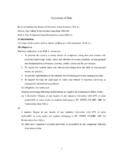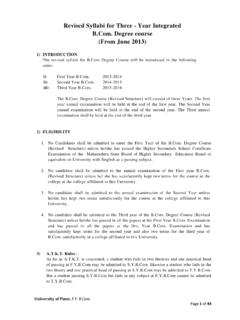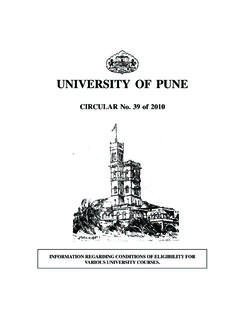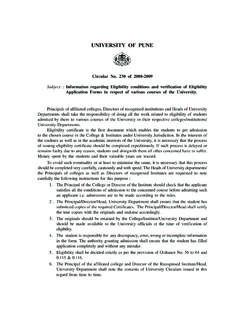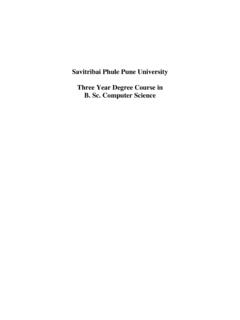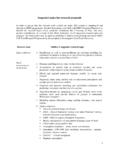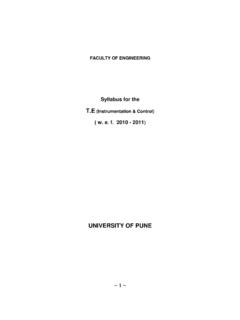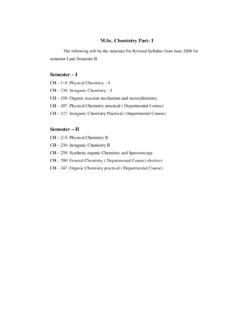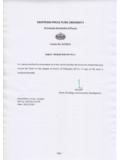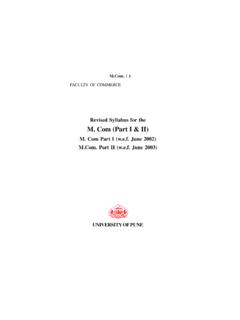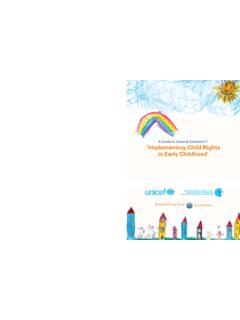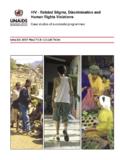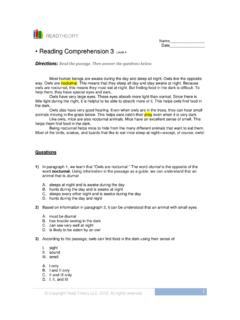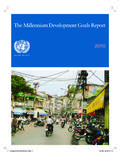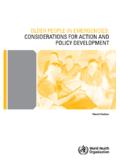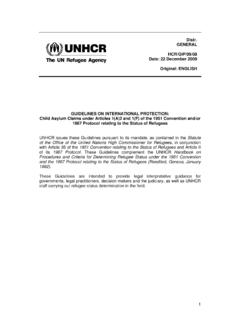Transcription of COURSE II HUMAN RIGHTS OF VULNERABLE AND …
1 1 COURSE II HUMAN RIGHTS OF VULNERABLE AND disadvantaged GROUPS 2 HUMAN RIGHTS OF VULNERABLE AND disadvantaged GROUPS COURSE BOOK II Due to Technical and other Reasons the Second COURSE Material could not be released as scheduled in September First Week. Since the students of various Departments have to write examinations, the material of this paper is uploaded in a rough version. The Content is final. Only it is not uploaded in the Final Version like the First Book. The Work is going on. As and when the work is completed the book will be uploaded and this version will be removed. Further The tile has been changed in view of suggestions by some colleagues of the HRE Committee. The New title is written in the paper expanding the old title. The COURSE NO. And other format remains same. This book is a first draft for student s reference.
2 The original and final copy of book will be uploaded soon. 3 CONTENTS Preface Introduction Syllabi of the COURSE UNIT I INTRODUCTION 1. Meaning of VULNERABLE and disadvantaged groups 2. Concept of VULNERABLE and disadvantaged groups UNIT II HUMAN RIGHTS OF WOMEN AND CHILDREN 1. HUMAN RIGHTS and Women s RIGHTS 2. International Scenario 3. Supervision 4. World Conferences on Women 5. International Women s Day 6. National Standards 7. National Policy of Women 8. Sum up (B) HUMAN RIGHTS and Children 1. Child RIGHTS : Efforts of the International community 2. Convention on the RIGHTS of the Child (CRC) 1989 3. UN Organs concerned Directly with the RIGHTS of Children 4. Brief overview of UNICEF ( United Nations Children s Fund) 5. World Children s Day 6. National Scenario of Children and Legal Position 7.
3 Legal provisions governing the RIGHTS of Children 8. National Commission for the protection Child RIGHTS 9. Sum up 4 Unit III Status and RIGHTS of Socially and Economically disadvantaged People 1. Status of Indigenous People and the role of UN 2. Role of UN 3. UN Declaration on the RIGHTS of Indigenous Peoples 2007 4. SC/ ST and other indigenous peoples in the Indian Legal scenario 5. Scheduled Tribes 6. RIGHTS of the Elderly Persons 7. International Scenario 8. Indian Scenario 9. Maintenance and Welfare of Parents and Senior Citizens Act 10. RIGHTS of Persons with Disability 11. Definition of Disability 12. UN and the Disabled 13. RIGHTS of persons with disability in India: 14. Laws Relating to Disabled 15. The Minorities and HUMAN RIGHTS 16. The Efforts of the International Community 17. Minorities and India 18. Constitutional RIGHTS and safeguards provided to the minorities in India 19.
4 National Commission for Minorities 20. Minorities Ministry 21. Sum Up 5 Unit IV. HUMAN RIGHTS of Special Category of VULNERABLE and disadvantaged Groups 1. Stateless persons 2. Concept of Nationality and Citizenship 3. Concept and Causes of Statelessness 4. Statelessness and International Legal Standards 5. Consequences of Statelessness on HUMAN RIGHTS 6. Some Current Challenges 7. Sum UP (B) SEX WORKERS 1. Definition of Sex Work 2. Sex Workers and International Efforts 3. Indian Scenario 4. Sum UP (C) Migrant Workers 1. International Efforts 2. Migrant Workers in India 3. Sum UP (D) HIV/AIDS VICTIMS 1. International Efforts: 2. HUMAN RIGHTS Violations Faced by HIV/AIDS People 3. HUMAN RIGHTS Violations Faced by HIV/AIDS People 4. Sum Up. Conclusion 6 Syllabi HUMAN RIGHTS OF VULNERABLE AND disadvantaged GROUPS I General Introduction Meaning and Concept of VULNERABLE and disadvantaged Groups Customary.
5 Socio-Economic and Cultural Problems of VULNERABLE and disadvantaged Groups II Social Status of Women and Children in International and National Perspective HUMAN RIGHTS and Women s RIGHTS International and National Standards HUMAN RIGHTS of Children-International and National Standards III Status of Social and Economically disadvantaged People Status of Indigenous People and the Role of the UN Status of SC/ST and Other Indigenous People in the Indian Scenario HUMAN RIGHTS of Aged and Disabled The Minorities and HUMAN RIGHTS IV HUMAN RIGHTS of Special Category of VULNERABLE and disadvantaged Groups State less Persons Sex Workers Migrant Workers HIV/AIDS Victims 7 Preface HUMAN RIGHTS have never shown any kind of discrimination towards any individual or group of people. They apply equally to any country or culture without any bias on grounds of sex, race, religion, caste or community and language.
6 They only advocate the welfare and well-being of all persons with equal treatment everywhere at all times. However, the socio-economic, political and cultural diversities, prevailing in each state across the world, and politics of the nation states, deprive the free exercise of HUMAN RIGHTS to a certain number of people. Any type of deprivation, which has a direct bearing on the right to life and dignity of people, certainly deprives them of the enjoyment of their guaranteed HUMAN RIGHTS . Such deprived people are normally referred to as VULNERABLE and disadvantaged communities or groups. In the realm of international law of HUMAN RIGHTS , these groups are broadly classified as women, refugees, disabled, internally displaced persons, HIV/AIDS victims, Migrant workers, minorities, mentally ill persons, trafficked persons, and sexual minorities In order to assist them to augment the RIGHTS guaranteed to everyone, the United Nations had adopted a number of specific international conventions and declarations with an aim to fix responsibility on the nation-states to take care of their RIGHTS .
7 Based on the mandate, the regional organizations, such as European Union, the Organisation of American States, African Union, and national governments have initiated a number of welfare schemes. However, due to poverty and other cross-cultural social problems many a times, a majority of VULNERABLE people are not able to access their basic needs, in spite of the efforts both at the international and national plane. To wipe out the miseries of these people, and to help them to achieve the equal status with that of the developed sections of a society, it is the responsibility of both nation-states and individuals to extend a helping hand to the extent possible to uplift them in realizing their RIGHTS . With this aim, this second book in the series of the HUMAN RIGHTS education programme will deal with the issues of some of the VULNERABLE groups in general and specific to that of Indian context by taking into consideration of the heterogeneous group of students of the University.
8 The objective of the Project of HUMAN RIGHTS Education for all initiated by the University, is only for promotion and propagation of HUMAN RIGHTS . There is no profit making aspect involved. The pictures presented are used from the various web resources of the UN and its organs, International, National, Non-Governmental Organisations, search engines and other websites sites to convey the message of HUMAN RIGHTS in an easy and understandable manner. In this regard the author expresses his gratitude to all the authors whose materials have consulted and whose websites we have browsed. In this regard, I am grateful to the authorities of European Parliament and European Commission for providing the fellowship of the Erasmus Mundus Lot 13 of India to visit and access the materials and other research facilities of the Lund University, Sweden, during my stay in 2010 and 2011, at the Centre for East and South Asian studies.
9 I am also highly grateful to 8 Prof Roger Greatrex, Director of the Centre for East and South Asian Studies and Dr Sidsel Hansson, Coordinator of the Erasmus Mundus Programme and Lecturer at the Centre for East and South Asian studies of the Lund University for their cooperation and encouragement . I express my sincere thanks to all the authorities of the University of Pune and the Hon ble Vice Chancellor Dr. Gade for reposing the trust and permitting me to continue my work as a coordinator of the HRE programme of the University. I am indebted to the former Vice Chancellors of the University, Dr R. K. Shevagonkar and Dr Sanjay Chhande for their constant encouragement and vision in the promotion of the Programme. I also sincerely express my thanks to all the members of the HRE programme of the University, and to all my colleagues of the University for seriously implementing the programme and making it a grand success.
10 I express my sincere thanks to the Dr. Sharmila Rege, Director of the Krantijyoti Savitribai Phule Women's Studies Centre and her colleagues for offering their revered comments and suggestions on the rough draft of this work. I take this opportunity to thank many of our well wishers and friends, especially Dr. Sadiq Jiliani Ahmad Syed, Senior Diplomat of the UN for patiently going through the script and for offering his valuable suggestions and corrections. I also express my thanks to Prof. Murty, Registrar, Jindal Global Law University, Haryana for offering the necessary feedback during the preparation of the work. I express my Sincere thanks to my students Mr. Dormaan Jamshid Dalal and Mr. Meghanad Karle for their constant support in many ways and means during the preparation of the book.
